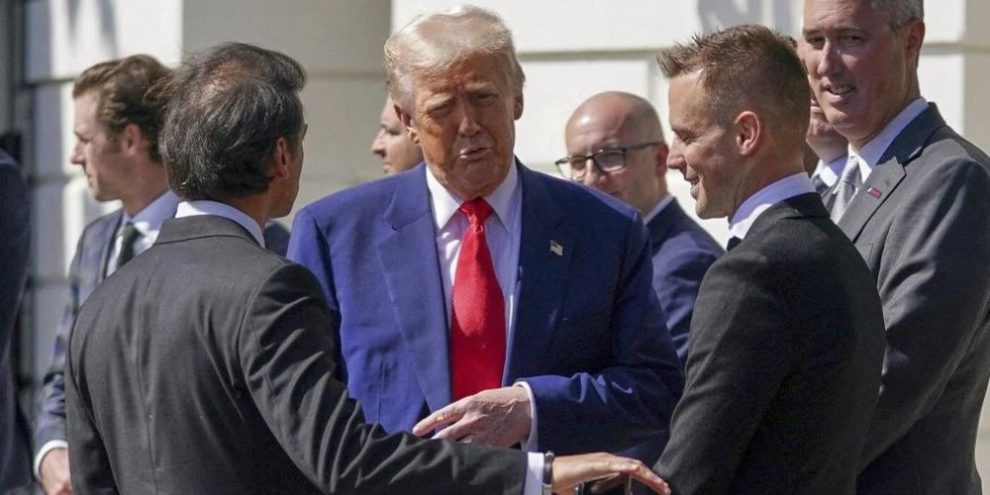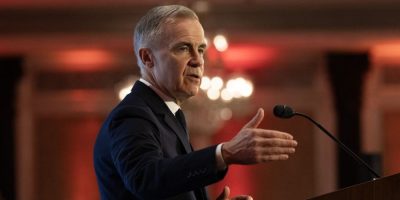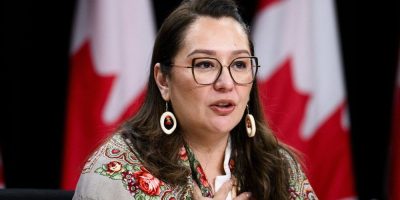
Canada's former top trade negotiator said Thursday that if nations around the world co-ordinate their responses to Donald Trump's global trade war, the U.S. president would be more likely to back away from tariffs sooner.
Speaking on a trade panel at the left-leaning Broadbent Institute's conference in Ottawa on Thursday, Steve Verheul said that Trump's abrupt change of course this week shows his administration is vulnerable to financial and market pressures.
"I think retaliation can be a useful tool, and it's unfortunate that most of the rest of the world didn't see it that way," Verheul said. "Because I think if there had been a more co-ordinated response from countries around the world, then we could have seen this fall away even more quickly."
As U.S. stocks dropped again Thursday, continuing a tumultuous week in the markets, Trump said he thinks "we're in very good shape."
"We think we are doing very well," Trump said during a meeting with his cabinet Thursday. "Again, there will be a transition cost and transition problems, but in the end it’s going to be a beautiful thing."
Barrie's News Delivered To Your Inbox
By submitting this form, you are consenting to receive marketing emails from: Central Ontario Broadcasting, 431 Huronia Rd, Barrie, Ontario, CA, https://www.cobroadcasting.com. You can revoke your consent to receive emails at any time by using the SafeUnsubscribe® link, found at the bottom of every email. Emails are serviced by Constant Contact
Despite the market rally after Trump abruptly reversed course Wednesday by pausing his so-called "reciprocal" tariffs for 90 days, much of world trade remains under massive U.S. duties.
Trump kept in place a universal 10 per cent tariff, as well as 25 per cent duties on steel, aluminum and automobile imports to the United States.
The president also pushed up tariffs on Chinese imports to 125 per cent.
The White House confirmed Thursday that the tariffs stack on top of fentanyl-related duties, adding up to a 145 per cent tariff on Chinese imports.
Beijing's 84 per cent retaliatory tariffs on U.S. products came into force on Thursday — escalating the trade war between the world's two largest economies.
U.S. tariffs on Canada have not changed.
Chad Wolf, former acting U.S. secretary of homeland security under Trump, addressed the right-leaning Canada Strong and Free Network Conference in Ottawa on Wednesday. Wolf said Trump's chaotic approach to trade policy is "by design" and a "feature, not a bug" of the administration.
"I did talk with (former U.S. trade representative Robert Lighthizer) a couple weeks ago and he said, 'Look Chad, if anyone talks to you and says they know what's going on — they don't know what's going on,'" said Wolf.
Lighthizer, who served in the first Trump administration, is scheduled to address that same conference on Friday. His remarks will not be open to the media.
Wolf said the administration works on "Trump time" and advised Ottawa to look for quick, immediate wins to sustain its longer-term efforts with the president, who views the world in a "transactional" way and expects speedy results.
Prime Minister Mark Carney posted on social media Wednesday that the reciprocal tariff pause was a "welcome reprieve for the global economy" but upcoming negotiations with countries around the world will result in a "fundamental restructuring of the global trading system."
Carney, who spoke with Trump by phone in late March, said the president has agreed to begin negotiations on a new economic and security agreement after Canada's April 28 election.
Canada and China are the only countries so far to maintain retaliatory tariffs on the United States. The European Union announced a 90-day pause on its countermeasures Thursday.
U.S. Commerce Secretary Howard Lutnick said Wednesday that if Canada keeps its retaliatory measures in place, it "would be a really, really bad choice."
Ontario Premier Doug Ford told CNN on Thursday that he was "shocked" when Trump's tariffs on Canada were not included in his 90-day pause. He said Canada would be ready to drop its retaliatory measures "tomorrow" if Trump abandons his tariffs.
Verheul served as Canada's chief trade negotiator from 2017 to 2021 when the Canada-U.S.-Mexico Agreement, also called CUSMA, was negotiated during the first Trump administration.
He said retaliatory tariffs are an important tool for pushing back on unfair trade actions and can help to balance positions at the negotiating table.
The 90-day pause will see dozens of countries attempt to negotiate an end to the tariffs. Lutnick said Thursday that there aren't enough hours in the day to talk with all the countries that have reached out.
"We are getting the respect we deserve now," he said.
Verheul said no matter what the United States' trade partners do, Trump could very well decide to reimpose tariffs at some point.
If that happens, he said, and if countries co-ordinate their response, Trump's tariffs wouldn't last long and the multinational effort also would send a strong message to the Trump administration.
"And I think that would be a significant rebuke to the U.S. about the merits of going in that kind of direction and completely obliterating trade laws that we've all operated under for the last 75 years," Verheul said.




